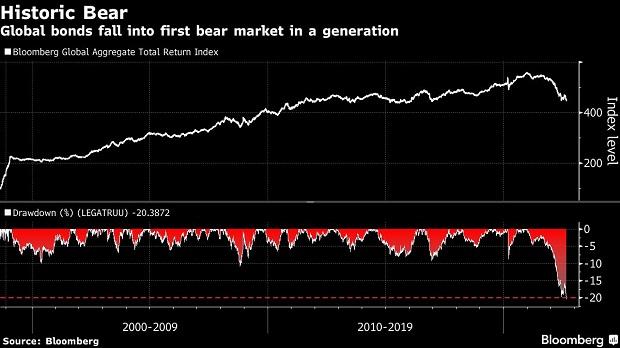Under pressure from central bankers determined to quash inflation even at the cost of a recession, global bonds slumped into their first bear market in a generation.
The Bloomberg Global Aggregate Total Return Index of government and investment-grade corporate bonds has fallen more than 20% below its 2021 peak, the biggest drawdown since its 1990 inception. Officials from the US to Europe have hammered home the importance of tighter monetary policy in recent days, building on the strong hawkish message from Federal Reserve Chair Jerome Powell at the recent Jackson Hole symposium.
Soaring inflation and the steep interest-rate hikes deployed by policy makers in response have brought to an end a four-decade bull market in bonds. That’s creating a particularly difficult environment for investors this year, with bonds and stocks sinking in tandem.
“I suspect that the secular bull market in bonds that started in the mid-1980s is ending,” said Stephen Miller, who’s covered fixed income since then and now works as an investment consultant at GSFM, a unit of Canada’s CI Financial Corp. “Yields aren’t going to return to the historic lows seen both before and during the pandemic.”
The very high inflation the world now faces means central banks won’t be prepared to deploy the sort of extreme stimulus that helped send Treasury yields below 1%, he added.

Investing Mainstay
The simultaneous swoons for fixed-income and equity assets are undermining a mainstay of investing strategies over the past 40 years or more. Bloomberg’s bond gauge is down 16% in 2022, while MSCI Inc.’s index of global stocks has seen a larger decline.
That has pushed a US measure of the classic 60/40 portfolio — where investments are split by those proportions between stocks and bonds — down 15% so far this year, on track for its worst annual performance since 2008.
“We are in a new investment environment, and this is a huge deal for those expecting fixed income to be a diversifier to risk off in equities,” said Kellie Wood, a fixed-income money manager at Schroders Plc in Sydney.

Back to the ’60s
In many ways the economic and policy realities now facing investors year hark back to the 1960s bear market for bonds, which began in the second half of that decade when a period of low inflation and unemployment came to a sudden end. As inflation accelerated through the 1970s, benchmark Treasury yields surged. They would later hit almost 16% in 1981 after then Fed Chair Paul Volcker had raised rates to 20% to tame price pressures.
Powell cited the 1980s to back his hawkish stance at Jackson Hole, saying “the historical record cautions strongly against prematurely loosening policy.” Swaps traders now see almost 70% odds that the Fed will deliver a third-straight hike of 75 basis points when it meets in just over three weeks.
Other central bankers at Jackson Hole, from Europe to South Korea and New Zealand, also indicated that rates will continue to rise at pace.
Still, fixed-income investors are showing plenty of demand for government bonds as yields rise, aided by lingering expectations that policy makers will need to reverse course should economic slowdowns help cool inflation. In the US, options markets are still pricing in at least one 25 basis point rate cut next year.
“I wouldn’t characterize the current trend as a new secular bond bear market but more of a necessary correction from a period of unsustainably ultra-low yields,” said Steven Oh, global head of credit and fixed income at PineBridge Investments LP. “Our expectations are that yields will remain low by long-term historical standards and 2022 is likely to represent the peak in 10-year bond yields in the current cycle.”
Schroders is also starting to see some value in government bonds as yields rise and it positions portfolios for the real risk of severe economic slowdowns, according to Wood.
“In the not so distant future, there is going to be a cracking opportunity to be buying bonds as central banks guarantee us a global recession,” she said.
 Dear Reader,
Dear Reader,
Business Standard has always strived hard to provide up-to-date information and commentary on developments that are of interest to you and have wider political and economic implications for the country and the world. Your encouragement and constant feedback on how to improve our offering have only made our resolve and commitment to these ideals stronger. Even during these difficult times arising out of Covid-19, we continue to remain committed to keeping you informed and updated with credible news, authoritative views and incisive commentary on topical issues of relevance.
We, however, have a request.
As we battle the economic impact of the pandemic, we need your support even more, so that we can continue to offer you more quality content. Our subscription model has seen an encouraging response from many of you, who have subscribed to our online content. More subscription to our online content can only help us achieve the goals of offering you even better and more relevant content. We believe in free, fair and credible journalism. Your support through more subscriptions can help us practise the journalism to which we are committed.
Support quality journalism and subscribe to Business Standard.
Digital Editor
Stay connected with us on social media platform for instant update click here to join our Twitter, & Facebook
We are now on Telegram. Click here to join our channel (@TechiUpdate) and stay updated with the latest Technology headlines.
For all the latest Business News Click Here
For the latest news and updates, follow us on Google News.
